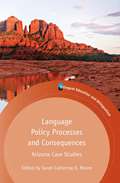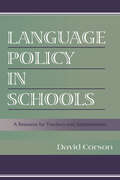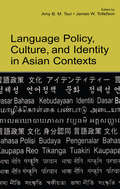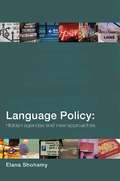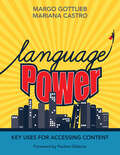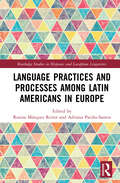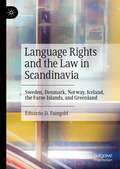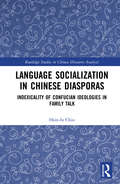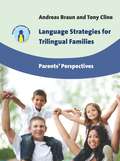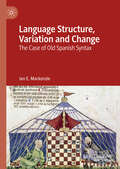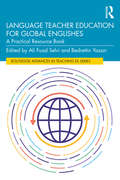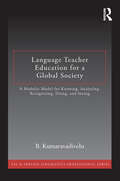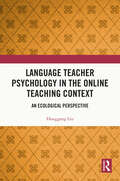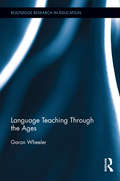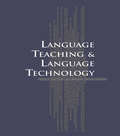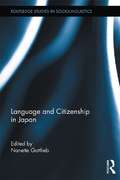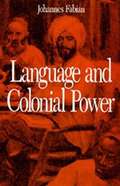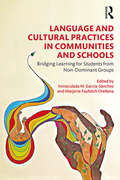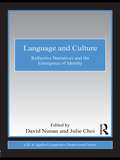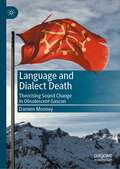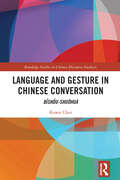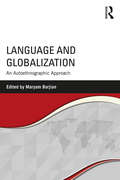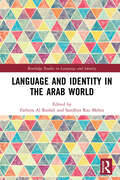- Table View
- List View
Language Policy Processes and Consequences
by Sarah Catherine K. MooreThis book accessibly and comprehensively outlines the highly complex case of the English-only movement and educational language policy in Arizona. It ranges from early Proposition 203 implementation to an investigation of what Structured English Immersion (SEI) policy looks like in today's classrooms, and concludes with a discussion on what the various cases mean for the education of English learners in the state.
Language Policy in Schools: A Resource for Teachers and Administrators
by David CorsonLanguage Policy in Schools provides school administrators and teachers a practical approach for designing a language policy for their school and for dealing with the language issues that confront schools, particularly those operating in settings of linguistic and cultural diversity. It can be used as a text in teacher and administrator preparation programs, graduate programs, and in-service and professional development programs. Special features include: * a clear, jargon-free writing style that invites careful reading; * abundant examples that students of education everywhere can learn from--including samples of school language policies developed for real schools by real teacher-researchers; * questions at the end of each chapter to highlight key points and stimulate informed discussion among pre-service and experienced teachers and administrators; and * an up-to-date international and cross-cultural biography.
Language Policy, Culture, and Identity in Asian Contexts
by Amy B. M. TsuiBringing together scholarship on issues relating to language, culture, and identity, with a special focus on Asian countries, this volume makes an important contribution in terms of analyzing and demonstrating how language is closely linked with crucial social, political, and economic forces, particularly the tensions between the demands of globalization and local identity. A particular feature is the inclusion of countries that have been under-represented in the research literature, such as Nepal, Bangladesh, Brunei Darussalam, Pakistan, Cambodia, Vietnam, and Korea. The book is organized in three sections: Globalization and its Impact on Language Policies, Culture, and Identity Language Policy and the Social (Re)construction of National Cultural Identity Language Policy and Language Politics: The Role of English. Unique in its attention to how the domination of English is being addressed in relation to cultural values and identity by non-English speaking countries in a range of sociopolitical contexts, this volume will help readers to understand the impact of globalization on non-English speaking countries, particularly developing countries, which differ significantly from contexts in the West in their cultural orientations and the way identities are being constructed. Language Policy, Culture, and Identity in Asian Contexts will interest scholars and research students in the areas of language policy, education, sociolinguistics, applied linguistics, and critical linguistics. It can be adopted in graduate and advanced undergraduate courses on language policy, language in society, and language education.
Language Policy: Hidden Agendas and New Approaches
by Elana ShohamyPolicies concerning language use are increasingly tested in an age of frequent migration and cultural synthesis. With conflicting factors and changing political climates influencing the policy-makers, Elana Shohamy considers the effects that these policies have on the real people involved. Using examples from the US and UK, she shows how language policies are promoted and imposed, overtly and covertly, across different countries and in different contexts. Concluding with arguments for a more democratic and open approach to language policy and planning, the final note is one of optimism, suggesting strategies for resistance to language attrition and ways to protect the linguistic rights of groups and individuals.
Language Power: Key Uses for Accessing Content
by Margo Gottlieb Mariana CastroHere, at last, is every K-8 teacher’s playbook on the critical role academic language plays in content learning and student achievement. What exactly is so different? Margo Gottlieb and Mariana Castro distill the complexities of language learning into four key uses through which students can probe the interplay between language and content, then demonstrate their knowledge and understanding. It’s as straight-forward as that.
Language Power: Key Uses for Accessing Content
by Margo Gottlieb Mariana CastroHere, at last, is every K-8 teacher’s playbook on the critical role academic language plays in content learning and student achievement. What exactly is so different? Margo Gottlieb and Mariana Castro distill the complexities of language learning into four key uses through which students can probe the interplay between language and content, then demonstrate their knowledge and understanding. It’s as straight-forward as that.
Language Practices Among Children and Youth in Indonesia
by Bernadette Kushartanti Dwi Noverini DjenarThis open access book presents studies of language use in Indonesia, focusing on children and youth. It reports on developments in the use of language for narrative production and within the realm of popular culture and traditional cultural practices in Indonesia. Through studies that include cohesion in narrative production, language in radio advertising, naming practices and formulaic prohibitions in Javanese, and speech presentation in popular fiction, the book provides insights into how sociocultural changes are reflected in language. This book is a useful resource for students and scholars conducting research on language and cultural practices in Indonesia, particularly in relation to children and young people.
Language Practices and Processes among Latin Americans in Europe (Routledge Studies in Hispanic and Lusophone Linguistics)
by Rosina Márquez Reiter and Adriana Patiño-SantosLanguage Practices and Processes among Latin Americans in Europe is an innovative and thematically organised collection of studies dedicated to contemporary sociolinguistic research on Latin Americans across European contexts. This book captures some of the language practices and experiences of Spanish-speaking Latin Americans (SsLAs) across various regions in Europe, addressing language uses, language ideologies, and experiences with languages in particular geographical contexts and settings across the ten chapters. The book provides a new lens to study the sociolinguistics of the migratory trajectories of Spanish-speaking Latin American migrants and the situated practices and processes in which they participate in their host societies. The comprehensive volume will be of interest to researchers in the area of Spanish sociolinguistics, sociology of language, and language ideology.
Language Rights and the Law in Scandinavia: Sweden, Denmark, Norway, Iceland, the Faroe Islands, and Greenland
by Eduardo D. FaingoldThis book examines the language policies in the constitutions, legal statutes, and regulations of Sweden, Denmark, Norway, Iceland, the Faroe Islands, and Greenland. In these countries and territories, modern descendants of Old Norse (North Germanic) are spoken today: Swedish, Danish, Norwegian, Icelandic, and Faroese. In addition, there are regions of Scandinavia where speakers of minority languages were conquered or incorporated, with their languages suppressed or neglected, as well as recent developments in the status and use of English, and immigrant populations who do not speak a Scandinavian language as their native language. This book adopts a comparative approach to trace the development of language policies and rights in Scandinavia, and it will be of interest to students as well as scholars of European and Scandinavian studies, applied linguistics, sociolinguistics, education, political science, and law.
Language Socialization in Chinese Diasporas: Indexicality of Confucian Ideologies in Family Talk (Routledge Studies in Chinese Discourse Analysis)
by Hsin-fu ChiuThe monograph provides ethnographically informed analyses of indigenous kin interactions in three Chinese diasporic households in the county of Los Angeles, California, U.S.A. Drawing upon the approach that regards talk as a form of social practice, the book demonstrates different ways in which kin relationships are indigenously orchestrated by foreign Chinese parents and their American-born children. Micro-analytically, social actions of membership categorization, attribution, deference, compliance, commands, and story-telling that unfold in kin interactions are foregrounded as key language devices to discuss ways in which epistemic asymmetry, power hierarchy, and harmony in kin relations are constructed or deconstructed in Chinese diasporic social lives. By way of illustration, the monograph, macro-analytically, speaks to the cultural stereotype of Chinese immigrant/foreign parents’ style of parenting when they pass on the traditional Confucian ideologies in kin interaction. This book can be a useful reference textbook for graduate courses that address the dynamic intricacy among language, culture, and society.
Language Strategies for Trilingual Families
by Andreas Braun Tony ClineThis book aims to enable parents in trilingual families to consider possible language strategies on the basis of analysing their individual circumstances. It includes a tool for diagnostic self-analysis that will help each reader to identify their situation and learn how parents in similar situations have approached the task of supporting their children's use of languages. Based on a unique survey of parents in trilingual families in two European countries, the book highlights the challenges that trilingual families face when living in mainly monolingual societies. It takes into account the recent emergence of a 'New Trilingualism' among educated parents who find themselves in trilingual families because of global trends in migration and the recent expansion of the EU.
Language Structure, Variation and Change: The Case of Old Spanish Syntax
by Ian E. MackenzieThis book offers an original account of the dynamics of syntactic change and the evolving structure of Old Spanish that combines rigorous manuscript-based investigation, quantitative analysis and a syntactic approach grounded in Minimalist thinking. Its analysis of both successful and failed changes demonstrates the degree of unpredictability caused by the interaction of competing factors and will shed fresh light on the assumed unidirectionality of linguistic change. Importantly, it reveals that Old Spanish and modern Spanish are more similar to one another than is usually supposed and demonstrates that many of the differences between the two varieties are quantitative rather than qualitative. This theoretically sophisticated examination of historical corpora will provide an invaluable resource for students and scholars of Old and modern Spanish, historical linguistics, sociolinguistics and syntax.
Language Teacher Education for Global Englishes: A Practical Resource Book (Routledge Advances in Teaching English as an International Language Series)
by Ali Fuad SelviThis practical resource book showcases both the theory and practical application for teacher educators in diverse contexts bringing a global Englishes perspective into their teacher education courses, both at pre- and in-service levels. The recent Global Englishes paradigm serves as a promising response to the complexity of identity, interaction, use, and instruction surrounding the English language. It is increasingly important to enhance teachers’ knowledge base—their specialized knowledge, skills, competencies, and commitments—vis-à-vis the changing needs of English Language Teaching. The chapters in the book provide accessible theoretical orientation to different aspects of the Global Englishes paradigm, from instructional materials to language assessment, and are complemented by a range of practical applications that promote teacher development. The volume is recommended as a viable professional development resource for teacher educators who are looking for activities and resources in preparing teachers for diverse teaching contexts, realities, affordances, and constraints.
Language Teacher Education for a Global Society: A Modular Model for Knowing, Analyzing, Recognizing, Doing, and Seeing (ESL & Applied Linguistics Professional Series)
by B. KumaravadiveluThe field of second/foreign language teacher education is calling out for a coherent and comprehensive framework for teacher preparation in these times of accelerating economic, cultural, and educational globalization. Responding to this call, this book introduces a state-of-the-art model for developing prospective and practicing teachers into strategic thinkers, exploratory researchers, and transformative teachers. The model includes five modules: Knowing, Analyzing, Recognizing, Doing, and Seeing (KARDS). Its goal is to help teachers understand: how to build a viable professional, personal and procedural knowledge-base, how to analyze learner needs, motivation and autonomy, how to recognize their own identities, beliefs and values, how to do teaching, theorizing and dialogizing, and how to see their own teaching acts from learner, teacher, and observer perspectives. Providing a scaffold for building a holistic understanding of what happens in the language classroom, this model eventually enables teachers to theorize what they practice and practice what they theorize. With its strong scholarly foundation and its supporting reflective tasks and exploratory projects, this book is immensely useful for students, practicing teachers, teacher educators, and educational researchers who are interested in exploring the complexity of language teacher education.
Language Teacher Psychology in the Online Teaching Context: An Ecological Perspective
by Honggang LiuEmploying a mixed-method approach, the book investigates the psychology of English as a Foreign Language (EFL) teachers in the online teaching environment in China during the COVID-19 pandemic.Specifically, questionnaires were conducted on Chinese EFL teachers to explore the profiles of EFL teachers’ anxiety, self-efficacy, buoyancy and engagement. Additionally, semi-structured interviews were used to demystify their psychological growth in the dynamic interaction with ecological environments, thus constructing an ecological model of EFL teacher psychology in online teaching. The book provides new insights into EFL teacher psychology and theoretical references for building a functional ecosystem for the professional development of EFL teachers.The book will be of interest to researchers in teacher psychology, language teachers and practitioners, especially those working in the complex technology-based educational environment, and policy makers in foreign language education.
Language Teaching Through the Ages (Routledge Research in Education #93)
by Garon WheelerKonrad Koerner, a leading historian of linguistics, has long said that an academic field cannot be considered to have matured until it has history as one of its subfields. The history of linguistics is a growing area, having come into its own in the 1960s, especially after Noam Chomsky looked for historical roots for his work. In contrast, the history of language teaching has been neglected, reflecting the insecurity and youth of the field. Most works on the subject have been written by linguists for other linguists, and typically focus on a specific period or aspect of history. This volume concentrates on the basic issues, events, and threads of the history of the field - from Mesopotamia to the present - showing how a knowledge of this history can inform the practice of language teaching in the present.
Language Teaching and Language Technology
by John Nerbonne Sake Jager Arthur Van EssenThis text assesses the importance of language technology to increasingly popular computer-assisted language learning work. The book contains writings on pronunciation, vocabulary, grammar, reading, writing, testing, distance learning and user studies.
Language and Citizenship in Japan (Routledge Studies in Sociolinguistics)
by Nanette GottliebThe relationship between language and citizenship in Japan has traditionally been regarded as a fixed tripartite: ‘Japanese citizenship’ means ‘Japanese ethnicity,’ which in turn means ‘Japanese as one’s first language.’ Historically, most non-Japanese who have chosen to take out citizenship have been members of the ‘oldcomer’ Chinese and Korean communities, born and raised in Japan. But this is changing: the last three decades have seen an influx of ‘newcomer’ economic migrants from a wide range of countries, many of whom choose to stay. The likelihood that they will apply for citizenship, to access the benefits it confers, means that citizenship and ethnicity can no longer be assumed to be synonyms in Japan. This is an important change for national discourse on cohesive communities. This book’s chapters discuss discourses, educational practices, and local linguistic practices which call into question the accepted view of the language-citizenship nexus in lived contexts of both existing Japanese citizens and potential future citizens. Through an examination of key themes relating both to newcomers and to an older group of citizens whose language practices have been shaped by historical forces, these essays highlight the fluid relationship of language and citizenship in the Japanese context.
Language and Colonial Power: The Appropriation of Swahili in the Former Belgian Congo, 1880-1938
by Johannes FabianAmong the preconditions for establishing colonial authority was communication with the colonised. Verbal exchanges depended on a shared communicative praxis providing common ground on which unilateral claims could be imposed. Use of, and control over, verbal means of communication were needed to maintain regimes - military, religious-ideological, economic - in power. In the Belgian Congo brutal physical force never ceased to be exercised. In this study Professor Fabian examines the more subtle uses of power through controls on communication, by looking at the history of Swahili as it spread from the East Coast to Central Africa and demonstrating connections between -changing forms of colonial power and the development of policies towards Swahili. Using a wide range of sources, including numerous and sometimes obscure vocabularies, he combines concepts derived from literary theory and sociolinguistics to uncover, through the flaws and failures of these texts, deep-seated attitudes to language and communication.
Language and Cultural Practices in Communities and Schools: Bridging Learning for Students from Non-Dominant Groups
by Inmaculada M. García-Sánchez Marjorie Faulstich OrellanaDrawing on sociocultural theories of learning, this book examines how the everyday language practices and cultural funds of knowledge of youth from non-dominant or minoritized groups can be used as centerpoints for classroom learning in ways that help all students both to sustain and expand their cultural and linguistic repertoires while developing skills that are valued in formal schooling. Bringing together a group of ethnographically grounded scholars working in diverse local contexts, this volume identifies how these language practices and cultural funds of knowledge can be used as generative points of continuity and productively expanded on in schools for successful and inclusive learning. Ideal for students and researchers in teaching, learning, language education, literacy, and multicultural education, as well as teachers at all stages of their career, this book contributes to research on culturally and linguistically sustaining practices by offering original teaching methods and a range of ways of connecting cultural competencies to learning across subject matters and disciplines.
Language and Culture: Reflective Narratives and the Emergence of Identity (ESL & Applied Linguistics Professional Series)
by David NunanThis state-of-the-art exploration of language, culture, and identity is orchestrated through prominent scholars’ and teachers’ narratives, each weaving together three elements: a personal account based on one or more memorable or critical incidents that occurred in the course of learning or using a second or foreign language; an interpretation of the incidents highlighting their impact in terms of culture, identity, and language; the connections between the experiences and observations of the author and existing literature on language, culture and identity. What makes this book stand out is the way in which authors meld traditional ‘academic’ approaches to inquiry with their own personalized voices. This opens a window on different ways of viewing and doing research in Applied Linguistics and TESOL. What gives the book its power is the compelling nature of the narratives themselves. Telling stories is a fundamental way of representing and making sense of the human condition. These stories unpack, in an accessible but rigorous fashion, complex socio-cultural constructs of culture, identity, the self and other, and reflexivity, and offer a way into these constructs for teachers, teachers in preparation and neophyte researchers. Contributors from around the world give the book broad and international appeal.
Language and Dialect Death: Theorising Sound Change in Obsolescent Gascon
by Damien MooneyThis book offers a systematic acoustic phonetic analysis of both language and dialect death in the region of Béarn, southwestern France. Focusing on Béarnais, a localised dialect of Gascon which is under pressure from French, the author explores the socio-political process of language shift, whereby members of a speech community cease to speak their indigenous language in favour of an incoming dominant language. Gascon is at an advanced stage of this process, making its remaining speakers excellent candidates for the study of language obsolescence, and this unique study will be of interest to researchers working in a broad range of disciplines, including language variation and change, language and dialect contact, Occitan and French, sociophonetics and phonology.
Language and Gesture in Chinese Conversation: Bǐshǒu-shuōhuà (Routledge Studies in Chinese Discourse Analysis)
by Kawai ChuiLanguage and Gesture in Chinese Conversation is a study of the semantic and temporal relationships between the speech and the gesture in the context of discourse interaction in Mandarin Chinese spoken in Taiwan. The cross-modal representation of ideas in natural discourse reveals the nature of BĬSHŎU-SHUŌHUÀ in the communication of meaning. The study addresses two central issues: • How do language and gesture represent the semantic information of various types of ideas? • How do the linguistic representation and gestural depiction pattern temporally in the communication of cross-modal information? The intended audience of this book are scholars in many academic fields, including linguistics, language and gesture, human communication, cognition, cognitive neuroscience, social psychology, sociology, linguistic anthropology, speech pathology, and speech therapy.
Language and Globalization: An Autoethnographic Approach
by Maryam BorjianIn this collection of real-life, personal narratives on the theme of language and globalization, scholars from a range of different sub-disciplines of linguistics, time periods, and geographical spaces throughout the world examine the interaction and intersectionality of languages and globalization and the implications of such interactions for world languages and cultures. A feature of the book is the application of autoethnography as its underlying approach/method, in which contributors draw on their own lived experiences (of life, scholarship, and work) to investigate and reflect on linguistic globalization and its issues and challenges against the backdrop of the globalized world of the 21st century.
Language and Identity in the Arab World (Routledge Studies in Language and Identity)
by Sandhya Rao Mehta Fathiya Al RashdiLanguage and Identity in the Arab World explores the inextricable link between language and identity, referring particularly to the Arab world. Spanning Indonesia to the United States, the Arab world is here imagined as a continually changing one, with the Arab diaspora asserting its linguistic identity across the world. Crucial questions on transforming linguistic landscapes, the role and implications of migration, and the impact of technology on language use are explored by established and emerging scholars in the field of applied and socio-linguistics. The book asks such crucial questions as how language contact affects or transforms identity, how language reflects changing identities among migrant communities, and how language choices contribute to identity construction in social media. As well as appreciating the breadth and scope of the Arab world, this anthology focuses on the transformative role of language within indigenous and migrant communities as they negotiate between their heritage languages and those spoken by the wider society. Investigating the ways in which identity continues to be imagined and re-constructed in and among Arab communities, this book is indispensable to students, teachers, and anyone who is interested in language contact, linguistic landscapes, and minority language retention as well as the intersections of language and technology.
